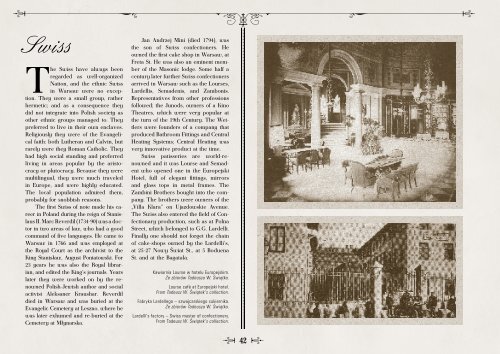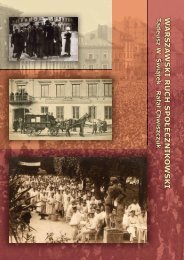You also want an ePaper? Increase the reach of your titles
YUMPU automatically turns print PDFs into web optimized ePapers that Google loves.
Swiss<br />
The Swiss have always been<br />
regarded as well-organized<br />
Nation, and the ethnic Swiss<br />
in Warsaw were no exception.<br />
They were a small group, rather<br />
hermetic; and as a consequence they<br />
did not integrate into Polish society as<br />
other ethnic groups managed to. They<br />
preferred to live in their own enclaves.<br />
Religiously they were of the Evangelical<br />
faith: both Lutheran and Calvin, but<br />
rarely were they Roman Catholic. They<br />
had high social standing and preferred<br />
living in areas popular by the aristocracy<br />
or plutocracy. Because they were<br />
multilingual, they were much traveled<br />
in Europe, and were highly educated.<br />
The local population admired them,<br />
probably for snobbish reasons.<br />
The fi rst Swiss of note made his career<br />
in Poland during the reign of Stanislaus<br />
II. Marc Reverdil (1734-90) was a doctor<br />
in two areas of law, who had a good<br />
command of fi ve languages. He came to<br />
Warsaw in 1766 and was employed at<br />
the Royal Court as the archivist to the<br />
King Stanisław, August Poniatowski. For<br />
23 years he was also the Royal librarian,<br />
and edited the King’s journals. Years<br />
later they were worked on by the renowned<br />
Polish-Jewish author and social<br />
activist Aleksaner Kraushar. Reverdil<br />
died in Warsaw and was buried at the<br />
Evangelic Cemetery at Leszno, where he<br />
was later exhumed and re-buried at the<br />
Cemetery at Młynarska.<br />
Jan Andrzej Mini (died 1794), was<br />
the son of Swiss confectioners. He<br />
owned the fi rst cake shop in Warsaw, at<br />
Freta St. He was also an eminent member<br />
of the Masonic lodge. Some half a<br />
century later further Swiss confectioners<br />
arrived in Warsaw such as the Lourses,<br />
Lardellis, Semadenis, and Zambonis.<br />
Representatives from other professions<br />
followed; the Junods, owners of a Kino<br />
Theatres, which were very popular at<br />
the turn of the 19th Century. The Wettlers<br />
were founders of a company that<br />
produced Bathroom Fittings and Central<br />
Heating Systems; Central Heating was<br />
very innovative product at the time.<br />
Swiss patisseries are world-renowned<br />
and it was Lourse and Semadeni<br />
who opened one in the Europejski<br />
Hotel, full of elegant fi ttings, mirrors<br />
and glass tops in metal frames. The<br />
Zambini Brothers bought into the company.<br />
The brothers were owners of the<br />
„Villa Klara” on Ujazdowskie Avenue.<br />
The Swiss also entered the fi eld of Confectionary<br />
production, such as at Polna<br />
Street, which belonged to G.G. Lardelli.<br />
Finally one should not forget the chain<br />
of cake-shops owned by the Lardelli’s,<br />
at 25-27 Nowy Świat St., at 5 Boduena<br />
St. and at the Bagatala.<br />
Kawiarnia Lourse w hotelu Europejskim.<br />
Ze zbiorów Tadeusza W. Świątka.<br />
Lourse café at Europejski hotel.<br />
From Tadeusz W. Świątek’s collection.<br />
Fabryka Lardellego – szwajcarskiego cukiernika.<br />
Ze zbiorów Tadeusza W. Świątka.<br />
Lardelli’s factory – Swiss master of confectionery.<br />
From Tadeusz W. Świątek’s collection.<br />
42




